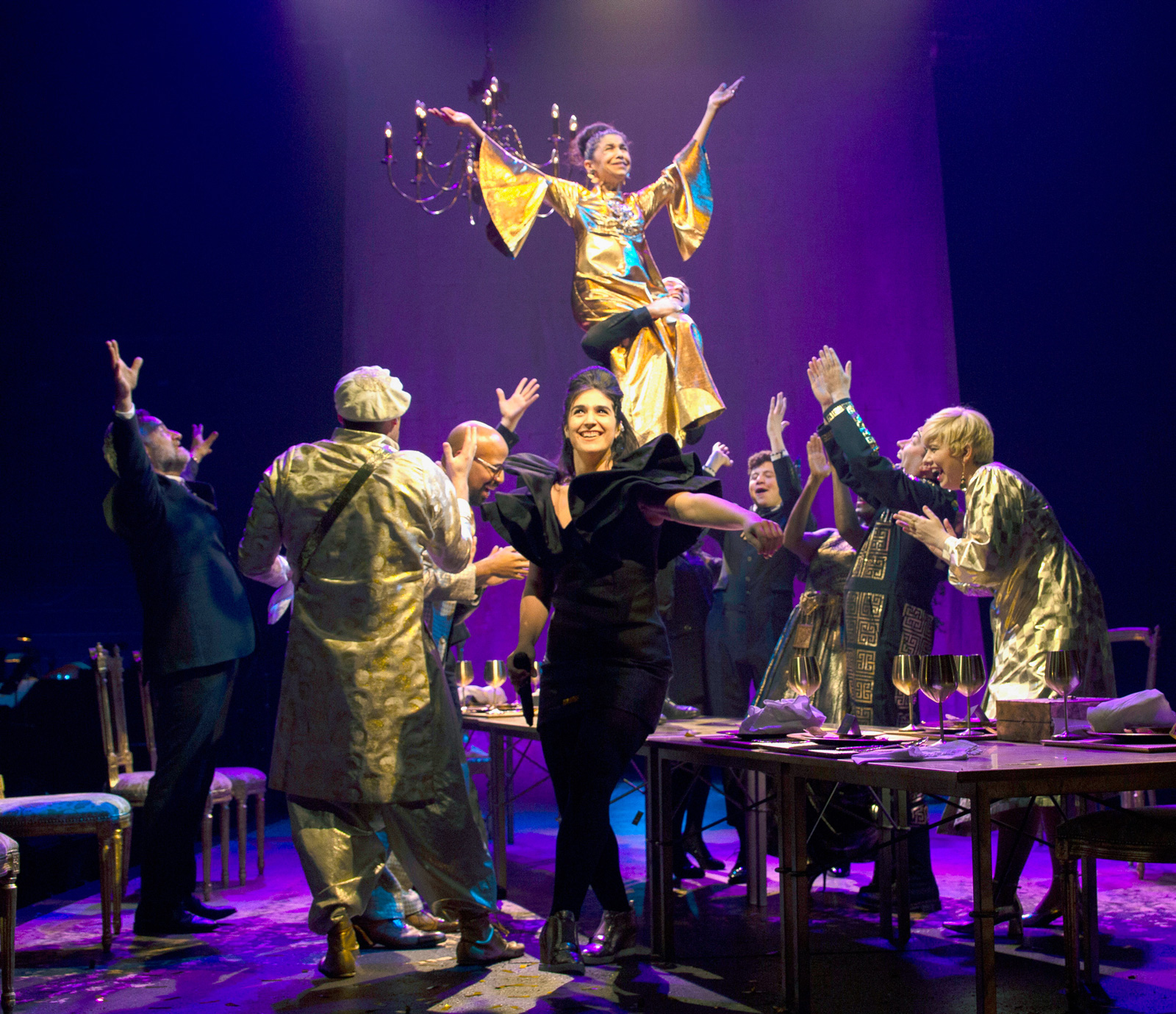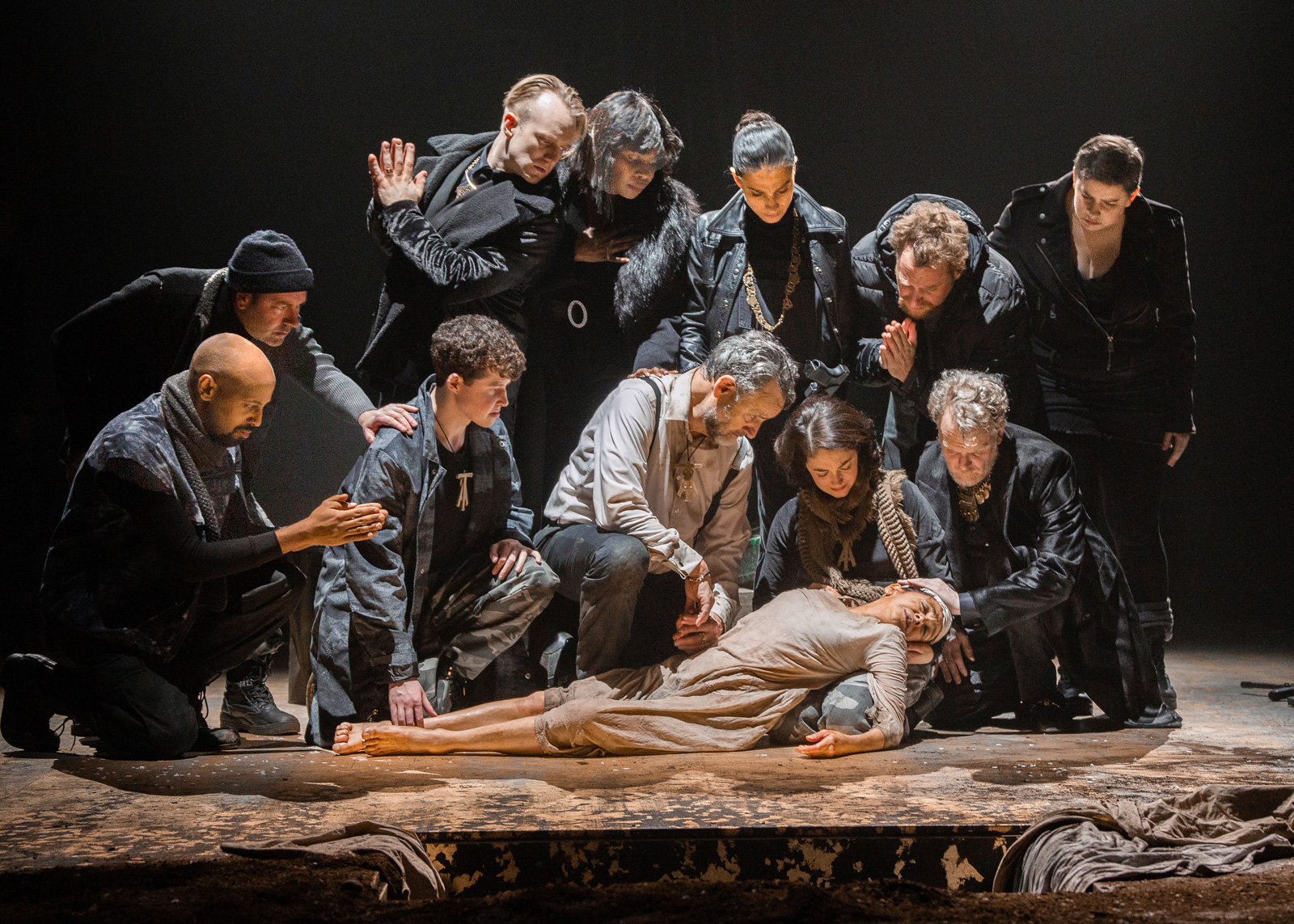Judging by how rarely it comes around, Timon of Athens seems destined to remain something of an anomalous outlier in the Shakespearian canon. A collaboration with Thomas Middleton written somewhere around the time of King Lear and Antony and Cleopatra, it was dropped into the First Folio apparently to fill a gap stemming from delays in clearing rights to Troilus and Cressida. The Folio text bears signs of being a work in progress, and no evidence survives that the play was ever performed in Shakespeare’s lifetime. Both in texture and dramatic arc it stands apart, its characters tending toward emblematic types, its structure that of a stark moral parable—a parable, moreover, whose ultimate purport remains naggingly unresolved.
The parable is about money, and the gist of the first half can be summed up by the lyrics of the old song “Nobody Wants You When You’re Down and Out.” All other human passions are subsidiary to lust for money and contempt for those no longer in a position to dole it out. Concerns of honor or friendship are swept aside—or rather, shown to have been empty in the first place—by questions of overspending, auditing, and aggressive debt collection. The play was a favorite of Karl Marx’s, who saw it as an illustration of the idea that “money is the alienated ability of mankind,” and its premise is instantly familiar to audiences who may never have encountered it but can recognize swiftly that they have been living it.
The production mounted by Theatre for a New Audience at the Polonsky Shakespeare Center, Brooklyn, starring Kathryn Hunter as Timon, is described in the program as taking place “sometime in the near future,” but its opening is very much of the present gilded age, with Timon’s stylishly attired wait staff laying out table settings for a high-end dinner party. As the guests, flattering hangers-on and preening vendors—a jeweler, a painter, a poet—stream in, some in costumes literally gilded throng to feed off the “magic of bounty” dispensed by the wealthy Timon. The atmosphere seems neither exaggerated nor, in the heart of a Brooklyn neighborhood now dominated by mushrooming luxury condos, culturally remote.
Kathryn Hunter, who over her long career has played a multitude of male roles from Lear to almost the whole cast of characters of Kapuściński’s The Emperor in 2018, has chosen to play Timon as a woman. In this gender switch, she is joined by Shirine Babb as the ingratiating Lucia (formerly Lucius), Helen Cespedes as the faithful servant Flaminia (ex-Flaminius), and—with more questionable consequences for the text—Elia Monte-Brown as an Alcibiades who is now, rather than a disgruntled Athenian general, the leader of a people’s army raised on behalf of “the wretched of the earth”(Franz Fanon’s phrase having been jarringly inserted). This recasting of an essentially all-male play, whose only female characters are some entertainers who appear briefly in the first half and two prostitutes accompanying Alcibiades in the second, upends the original less than might be expected: money, after all, is money, whether owed to Lucius or Lucia. Change “Lord Timon” to “Lady Timon” and adjust a few pronouns, and hardly any further textual adjustment is required. That is not to say that the effect is neutral, only that its nuances kick in slowly and steadily throughout the performance; Flaminia, Lucia, and the female warrior Alcibiades each takes on a character quite distinct from anything indicated in the text. As for Hunter’s Timon, her eventual withdrawal from human association seems all the more radical as a rejection of every female role evoked in her speeches: matron, wife, maiden, prostitute.
Timon indeed is a conspicuously ungendered figure among Shakespeare’s tragic personages, a character without spouse or children or kin of any sort, and without any friends whose affection has not been purchased with expensive gifts and lavish hospitality. He is scarcely aware of the only genuine love he might rely on: that of the servants who fully appreciate his good nature, and who closely observe those who exploit it. This is a character defined at the outset by nothing more than the seemingly compulsive need to shower gifts and gold on a mob of ornately fawning friends. Timon as observed in the first long scene can be reduced to someone rapt in the act of giving—paying a friend’s fine to deliver him from prison, bestowing an expensive dowry on a servant so he can marry the daughter of an Athenian lord—while, already, characters on the sidelines are commenting on the naivety of his trust and the folly of his spending. In short order bereft of wealth through overextended borrowing and unchecked generosity, he is abruptly abandoned by the recipients of that generosity, in a sequence of sharp satirical scenes likely written by Middleton.
Advertisement
Thereupon Timon drops out of society and repairs to the wilderness to live on roots and, for two acts, to deliver a suite of variations on one theme: “I am Misanthropos and hate mankind.” Those solitary tirades, unmistakably Shakespearean, are a distillation of stored-up curses ceaselessly rehearsing a world-leveling fury, rising into summits of eloquence in the disquisitions on gold (“This yellow slave / Will knit and break religions”) and universal thievery (“The moon’s an arrant thief / And her pale fire she snatches from the sun”), yet they are directed entirely outward. Any capacity Timon might have for self-reflection is buried in the silence into which he retreats after his ultimate speech in the play: “Let language end.” He is one character split into two unreconcilable abstractions—the limitless benefactor and the hater of all humanity, ultimate giver and ultimate withholder—and in neither condition does he catch sight of his own image. If other great Shakespearean roles are notable for the multiple selves they contain, this one leaves plenty of blank spaces for an actor to fill.
Hunter, who can command a stage from the moment of stepping out on it, has no difficulty filling those gaps. From her first sweeping entrance into the banquet room, she proceeds to build a character of her own, in a play whose text has likewise been extensively reworked—not only cut but rearranged and supplemented—by Emily Burns, who was hired as a literary consultant, and the director, Simon Godwin. Hunter’s overflowing and constantly shifting expressiveness lends itself perfectly to the bounteous Timon of the opening scenes. She could be a Park Avenue hostess and arts patron, handing out jewelry as party swag, an eccentric enthusiast who exults in making life pleasurable for the dinner guests delighted to bask in her personality as an additional perk. She appears joyfully oblivious to the pitfalls of her position that are clear to others, such as the railing philosopher Apemantus (played by Arnie Burton as a sort of downtown gadfly tolerated for adding spice to society dinner parties).
Yet, in the very brimming of Timon’s social effervescence, Hunter manages to suggest the core of loneliness in someone who seeks to bind others to her with gifts and good turns. She hints at a deliberate refusal to see, a fitful awareness of her world’s illusoriness. Her argument with Apemantus at the close of the opening banquet scene ends up as the familiar mutual needling of old sparring partners, perhaps the closest thing she has to a genuine friendship. That note of loneliness in the first half is echoed more forcefully in the second, at the end of the long scene in which Apemantus seeks out Timon in the woods—to accuse her, in effect, of stealing his act (“Men report / Thou dost affect my manners and dost use them”). In the Shakespearean text this culminates in an exchange of vituperation both unusually prolonged and atypically banal (“Beast!” “Slave!” “Toad!” “Rogue, rogue, rogue!”). Here the verbal insults are augmented by an all-out wrestling match in the dirt until the moment when Timon embraces her old acquaintance and gives way to an expression of grief: a note of vulnerability and emotional exhaustion serving to reshape the character.
Whether that reshaping softens the play is another question. Timon was classed by the Folio editors among the tragedies, but it can more easily be played—and here largely is—as abrasive satiric comedy. Yet Timon’s many extended soliloquies, with their mix of abuse, sexual invective on the theme of syphilitic infection, and a strain of disgust at humanity that attains a note of sublime revulsion, are hard to locate within a known dramatic genre. The whole second half settles into a kind of stasis when Timon—having discovered a cache of buried gold while digging for roots—receives a series of visitors, all of whom are treated to further statements of the theme of intrinsic human corruption. It’s almost as if Shakespeare is reverting to the manner of an earlier generation’s morality plays, with precisely their mix of sententiousness and coarseness. These passages might conceivably be pitched as full-on unvarying rant, but Hunter finds a range of possibilities beyond howled imprecations.
By the time she gets to her wilderness outpost, she has already passed through the rage of betrayal at the end of the first half—a transition signaled in the climactic scene in which the false friends are invited to a second feast, this one consisting (in the text) of lukewarm water and stones. Here the water has been replaced by bowls of blood, with which Hunter splatters herself as well as the guests, making her own pain symbolically visible while still allowing scope for the farcical ending as the guests scramble for their caps and jewels. After hitting that high note of suffering, Hunter moves into a different space. Her exiled Timon is capable of defiant sarcasm, mischievous wit, moments of philosophically amused resignation, and even the suggestion that the life of a hermit has its quiet, self-sufficient satisfactions. The remedy for needing everybody is needing nobody.
Advertisement
Through these modulations, Hunter invents a more bearable and perhaps a more plausible Timon, diminishing the unmitigated rage of a character who, after all, seeks finally to foment the destruction of humanity in any way possible, saying to Alcibiades, who sweeps through leading insurgent troops toward Athens: “Be as a planetary plague… Let not thy sword skip one.” Hunter’s Timon tends more toward rough playfulness, interacting with the audience in the front rows with some edgy but not too disquieting banter, and getting laughs by inveigling the unctuous Painter into eating worms.
At times, Hunter seems to be having too much fun to be a hardline hater. But she is a performer capable of rapid and restless transformations that can alter a mood in seconds. Her flair for those transitions asserts the power Timon has achieved by giving up everything. Unarmed, powerless, and dispossessed, she attains dominance over the thieves, sycophants, and Athenian emissaries who attempt to rob and exploit her. The moment when she invites the people of Athens to ease their suffering by hanging themselves on her tree is perfectly timed as the play’s comic punchline, and the bracing strangeness of the work emerges in its juxtaposition with her announcement of impending death: “Graves only be men’s works and death their gain, / Sun, hide thy beams, Timon hath done her reign.”
Nothing is more unfinished about Timon of Athens than its ending, and its difficulties were not resolved by this production’s editorial interventions. The effort to turn the lecherous and vengeful Alcibiades into a revolutionary ideologue, indicated early on by the insertion of Fanon’s phrase among other hints, attempts to set up a satisfying resolution that the play as such, in which the Alcibiades subplot’s details and thematic links to Timon’s story are never fully developed, so clearly lacks. A great deal of cutting and rearranging in the last act seems to cast Alcibiades’ triumphant entry into Athens as a progressive political victory (chiefly by heavy emphasis on the word “peace”) for a revolution that has figured as no more than a few interpolated catchphrases. So it seemed, at least, unless the automatic weaponry toted by Alcibiades’s troops were intended as an ironic counterpoint to such a reading.
In the midst of all that, the news of Timon’s death is augmented by her body’s being carried onstage and deposited among mourners in a Pietà-like composition. Swelling music encourages the sense that we have arrived at a point of ultimate significance, but it is not clear what that point might be. Here was a moment when it might have been better to respect the blank spaces. In the play, Timon simply disappears from view, leaving behind a grave and an epitaph—“Here lie I, Timon, who alive all living men did hate”—the record of an intransigence seeking at last only to mix with the elements. Timon’s absence is the most expressive coda imaginable, leaving the impenetrable image of a coastal tomb washed by waves, beyond language and beyond hate entirely.
Timon of Athens is at Theater for a New Audience through February 9.





